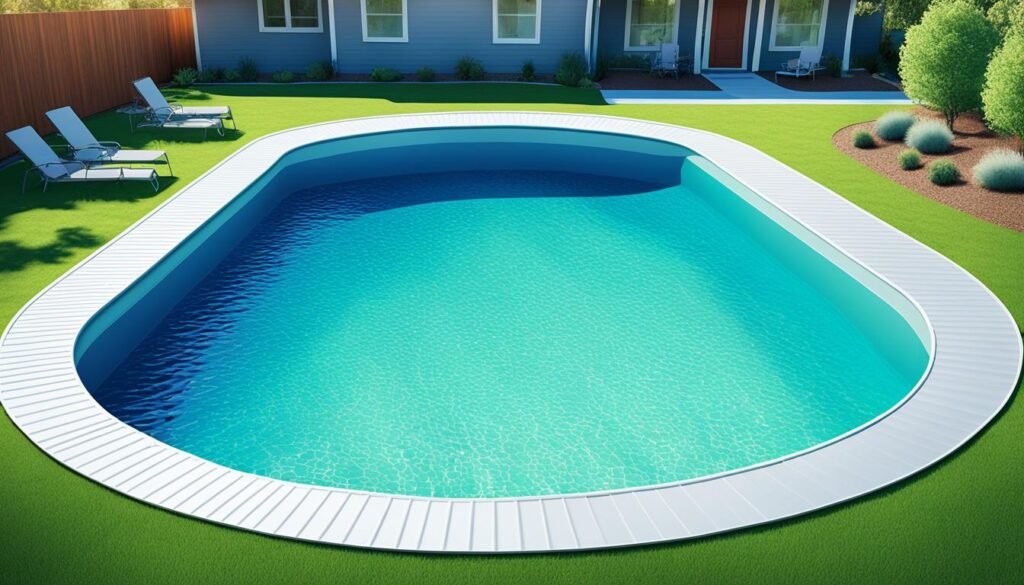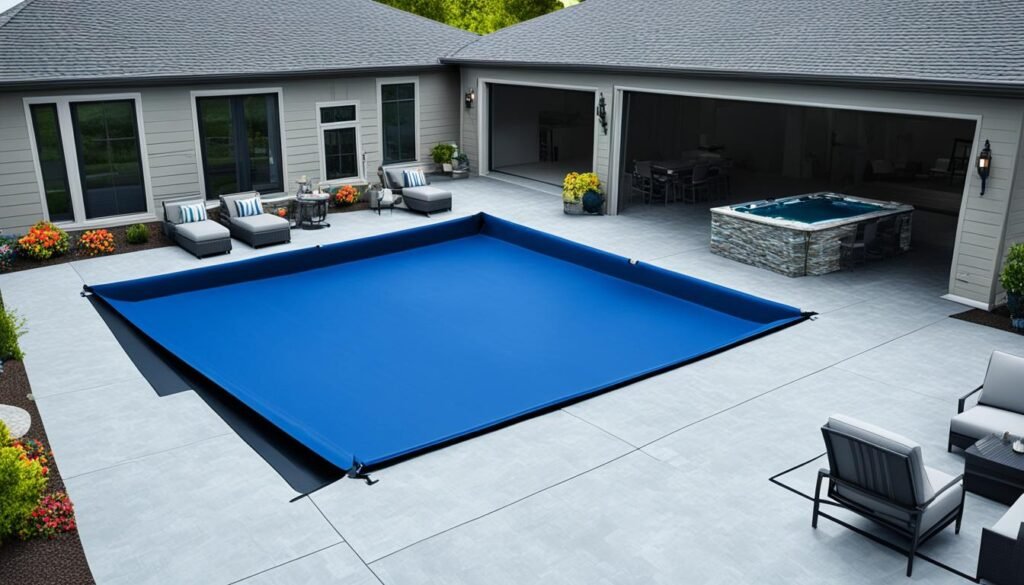Deciding whether to purchase a pool cover often boils down to a simple question: Are pool covers worth the money? For many homeowners, especially in areas like South Africa where pools are common, the upsides of investing in a pool cover can be substantial. Beyond the initial cost, pool cover benefits stretch from saving on maintenance to improving safety measures. The array of cost-effective pool covers available today embodies a blend of functionality and style, making them an appealing add-on for any pool owner. Reasons to invest in a pool cover are numerous and convincing, with a significant return on investment (pool cover ROI) that can be observed both in the short and long term. Seeking out the best pool covers for the price not only ensures a cleaner, safer pool but also a smarter, energy-efficient way to manage this backyard luxury.
As the interest in eco-friendly and cost-saving solutions surges, pool owners are increasingly asking: Are pool covers worth the investment? The answer largely lies in the long-term gains that these covers guarantee. Whether it’s through slashing heating costs or curbing chemical use in pool maintenance, the cost-effective pool covers magnify their worth over their typically long lifespan.
Key Takeaways
- Pool covers significantly reduce cleaning and heating expenses for pool owners.
- Advanced technologies like EnergyGuard GeoBubble optimize energy efficiency.
- Investing in a pool cover can be cost-effective, saving up to 70% in operating costs.
- Modern pool cover designs do not sacrifice aesthetics for functionality.
- With proper maintenance, pool covers can have an impressive lifespan, enhancing their ROI.
- Pool covers are not just a financial investment, but also ensure enhanced safety for pets and children.
- Automatic covers, such as those by PoolDeck, combine convenience with sturdy support for added peace of mind.
Evaluating the ROI of Pool Covers
When considering a pool cover, homeowners often weigh the initial cost against the long-term benefits. Understanding the return on investment (ROI) associated with pool covers is essential in making an informed decision that aligns with the need for cost-efficiency and energy savings.
The Cost-Effectiveness of Various Pool Cover Types
Choosing the right pool cover involves assessing the specific advantages and price points of various types. Money-saving pool cover options come in many forms, with each catering to different objectives and budgets. Solar covers, for instance, offer both heat retention and evaporative loss reduction, positioning them as a popular, cost-effective option. For heightened safety and durability, robust automatic covers might represent a higher upfront cost but deliver significant value over time.
Understanding the Savings: Energy Efficiency and Maintenance Costs
Energy efficiency is a paramount advantage of quality pool covers. By providing an insulating layer, these covers directly reduce the costs associated with heating the pool. Pool cover savings are realized through the decrease in energy bills and conservation of water, making them an eco-friendly and economically sound investment. Additionally, the reduction in maintenance requirements, such as cleaning and chemical treatments, further bolsters the cost-effectiveness of these pool cover solutions.
Assessing the Longevity and Durability of Pool Cover Options
The longevity of a pool cover significantly contributes to its ROI. High-quality materials extend the lifespan, offering years of consistent performance. Proper care like routine cleaning and correct storage amplifies the financial and functional returns. The table below outlines the expected durability and maintenance levels of different pool cover types, thereby assisting homeowners in identifying the best pool covers for the price.
| Type of Pool Cover | Expected Lifespan | Maintenance Level | Key Advantages |
|---|---|---|---|
| Solar Covers | 3-5 years | Low | Heating efficiency and water conservation |
| Automatic Covers | 5-8 years | Medium | Safety and ease of use |
| Mesh Safety Covers | 10-15 years | Medium | Durability and debris protection |
| Vinyl Covers | 7-11 years | High | Aesthetic appeal and UV protection |
The robust construction of cost-effective pool covers offers a practical solution to the diverse needs of pool owners. Each type presents its own set of pool cover advantages, reinforcing the notion that investing in the right cover can lead to conspicuous pool cover savings and overall satisfaction.
Are Pool Covers Worth the Money?
When evaluating the reasons to invest in a pool cover, homeowners quickly discover the breadth of pool cover advantages that go beyond the superficial. Not only does a quality pool cover act as a layer of security, but it also presents a suite of cost-reducing benefits. One of the most compelling aspects of pool cover ownership is the capacity for energy conservation and the subsequent financial savings it offers.

Heat retention is a significant feature where pool covers excel. By maintaining the pool’s temperature, they reduce the reliance on external heating sources. This thermal efficiency is one of the principal money-saving pool cover options as it cuts down on the energy required to keep the pool at a comfortable temperature. Moreover, modern pool covers are designed to integrate seamlessly with the existing landscaping and architecture, ensuring that the aesthetic value of the property is not only preserved but enhanced.
- Energy Savings: Reduced necessity for supplementary pool heating.
- Maintenance Ease: Less debris and contamination, simpler cleaning routines.
- Water Conservation: Substantially lowered evaporation rates.
- Safety Measures: Prevents accidents by acting as a barrier.
The protection against evaporation signifies another pool cover advantage, notably in regions where water conservation is imperative. With a robust pool cover, the amount of water loss is minimized, easing the strain on local water resources and shrinking the environmental footprint of the pool. These practicalities confirm that investing in a pool cover is not just a responsible choice for the environment but also a shrewd financial move.
“Investing in a high-quality pool cover transcends immediate savings, unfolding as a long-term economic strategy that offers compound benefits across safety, operational costs, and environmental responsibility.”
In conclusion, the advantages of pool covers display a clear consensus within the pool owner community. Given their dual promise of cost-effectiveness and functional improvement, pool covers are not just worth the investment but essential for the modern pool owner aiming to balance luxury with sustainability.
Conclusion
The journey of exploring pool cover benefits concludes with an affirmation of their inherent value. Facilitating unparalleled safety enhancements and the gift of peace of mind, pool covers stand as essential investments for every pool owner. By functioning as a preventive barrier, they transform outdoor recreational areas into secure zones for families and pets alike. The commitment to safety paired with elegant design integration means that pool covers bring both security and sophistication to the modern home.
Safety Enhancements and Peace of Mind
With the potential to endure substantial weight, pool covers are more than an accessory; they are an indispensable part of pool safety. This safety feature is paramount, especially when considering the vulnerability of unsupervised children and pets. Heartening is the fact that this protection comes without compromising the visual appeal of the property, making pool covers not only a wise choice but also an aesthetically pleasing one.
Summarizing the Financial and Environmental Benefits
The financial and environmental advantages of installing a pool cover are evident. The long-term cost-effectiveness of reduced heating needs, maintenance, and the conservation of water results in substantial pool cover savings. By embracing these cost-effective pool covers, homeowners support sustainable practices, confirming that reasons to invest in a pool cover extend beyond the immediate perimeters of their pools.
Deciding on the Right Pool Cover for Your Needs
Selecting the best pool covers for the price doesn’t have to be a daunting task. Whether prioritizing ROI, durability, or specific features, options abound to meet every requirement and preference. Remarkable is the convergence of safety, environmental stewardship, and financial prudence that makes the decision to secure a pool cover a discerning one. Thus the adage holds true – the best investments are those that protect what we treasure while yielding enduring rewards.
FAQ
Are pool covers worth the money?
Yes, pool covers are considered a worthwhile investment for several reasons. They provide safety, decrease cleaning and maintenance costs, reduce water evaporation, minimize chemical use, and save on energy costs by retaining heat. This multifaceted functionality typically leads to significant cost savings over time, bringing about a favorable return on investment (ROI).
What are the primary benefits of investing in a pool cover?
Investing in a pool cover brings multiple benefits such as enhanced safety by preventing accidental falls into the pool, reduced evaporation leading to water and chemical savings, improved heat retention which cuts down on energy costs required to heat the pool, lowered maintenance time and costs, and protection against debris and dirt.
How cost-effective are various pool cover types?
The cost-effectiveness of pool covers depends on the type and features. Manual covers, thermal blankets, and automatic covers each have different price points and benefits. Some, like the EnergyGuard GeoBubble, specialize in energy efficiency, while automatic covers like the PoolDeck offer safety and convenience. While initial costs can vary, all pool covers offer substantial savings by reducing operational and maintenance expenses.
Can you explain the energy efficiency and maintenance cost savings with pool covers?
Pool covers significantly improve energy efficiency by insulating the pool and reducing evaporation—the main cause of heat loss. This results in lower heating costs. A pool cover also keeps out debris and limits light exposure, reducing algae growth and the frequency of cleaning, which in turn cuts down chemical usage and ongoing maintenance costs.
How do longevity and durability affect the ROI of pool covers?
The longevity and durability of pool covers directly influence their ROI. High-quality materials and proper maintenance can extend a pool cover’s lifespan, sometimes up to 10 years or more. This means the benefits of lower maintenance, energy, and operational costs can be reaped over a longer time frame, making the investment even more cost-effective.
What should I consider when selecting the best pool cover for the price?
When selecting a pool cover, consider factors such as compatibility with your pool size and shape, the specific benefits you prioritize (such as safety features, energy savings, or ease of use), the quality of materials, and the durability and warranty offered by the manufacturer. Look for a balance between upfront cost and potential long-term savings to get the best value for your investment.
In terms of safety enhancements, how do pool covers provide peace of mind?
Pool covers act as a barrier that can prevent accidental falls, especially of children and pets, into the pool. Many covers are designed to support significant weight, adding an extra level of security. Knowing that your pool is safely covered when not in use provides invaluable peace of mind to homeowners.
Can pool covers also benefit the environment?
Yes, by reducing the need for frequent water refills due to less evaporation and cutting down on energy consumption for heating the pool, pool covers contribute to a lower carbon footprint. This environmentally friendly aspect is an additional benefit, complementing the financial savings that pool covers offer.
How do I decide on the right pool cover for my needs?
To decide on the right pool cover, evaluate what you prioritize most, whether it’s safety, energy savings, ease of use, or aesthetics. Research different types of pool covers and their respective benefits, and consider factors like your local climate, pool usage patterns, and budget. It’s also wise to consult with professionals to find a cover that fits your pool’s unique specifications and your personal preferences.

